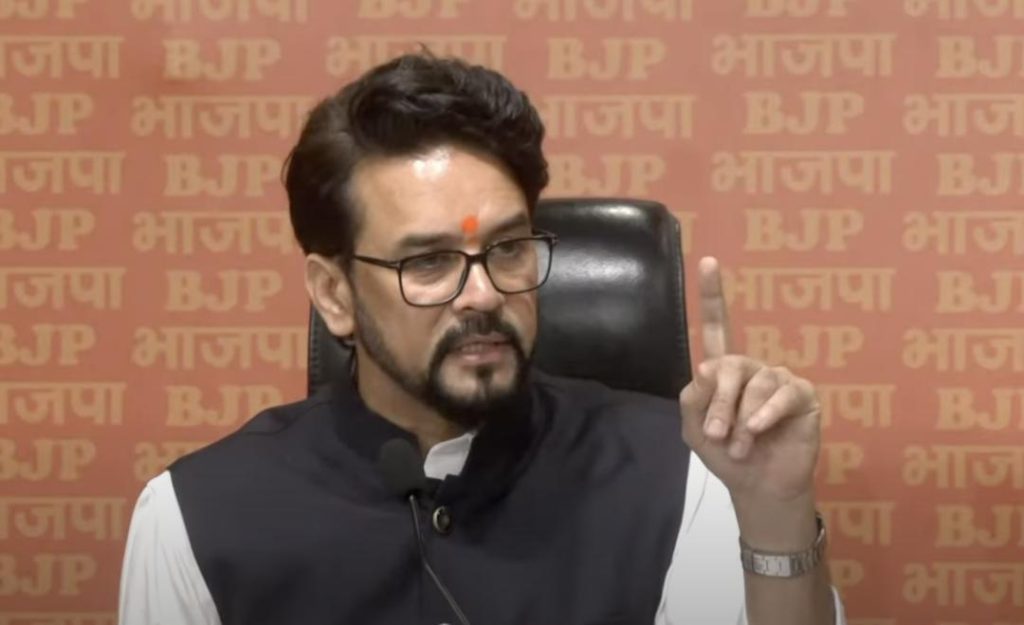
Congress & CPI made Bhimrao Ambedkar lose the poll in 1952: BJP
In a recent statement, BJP MP Anurag Thakur has stirred up a controversy by claiming that the Congress party, along with the Communist Party of India (CPI), played a role in defeating Dr. Bhimrao Ambedkar, the architect of the Indian Constitution, in the 1952 general elections. According to Thakur, the two parties worked together to eliminate Ambedkar, a Dalit leader, from the political scene.
Thakur’s statement was made during a press conference, where he claimed that the Congress and CPI conspired against Ambedkar to ensure his defeat. He also pointed out that a significant number of votes were rejected in the election, with 74,333 votes being declared invalid.
“It is a fact that Congress and CPI together defeated Dr. Bhimrao Ambedkar, a constitution maker and a saint-like leader, in the election,” Thakur said. “Congress ensured that a constitution maker, a Dalit leader, was eliminated in the very first election. This is a shameful chapter in Indian democracy.”
Ambedkar, who was a key figure in the Indian freedom movement and a leading Dalit leader, contested the 1952 general elections as an independent candidate from Bombay’s South Central constituency. However, despite his popularity and influence, he lost the election to a Congress candidate.
Thakur’s statement has sparked a heated debate, with many questioning the validity of his claims. While it is true that Ambedkar lost the election, the exact circumstances surrounding his defeat are still a matter of debate.
One of the main reasons cited for Ambedkar’s defeat was his decision to contest the election as an independent candidate, rather than joining a political party. At the time, Ambedkar was a member of the Indian National Congress, but he broke away from the party due to differences with its leadership. His decision to contest as an independent candidate made it difficult for him to secure the support of other political parties, which ultimately contributed to his defeat.
Another factor that may have contributed to Ambedkar’s defeat was the electoral system in place at the time. The 1951 Constitution of India introduced a new system of proportional representation, which allowed parties to contest elections in multiple constituencies. This made it difficult for independent candidates like Ambedkar to win seats, as they were forced to compete with parties that had more resources and support.
Despite these challenges, Ambedkar’s defeat was still a significant setback for the Dalit community, which had seen him as a powerful advocate for their rights. His loss was seen as a blow to the community’s quest for social and economic justice, and it marked the beginning of a new era of struggle for Dalit rights in India.
In recent years, there has been a growing debate about the role of Congress in Ambedkar’s defeat. Some have argued that the party deliberately worked to undermine Ambedkar’s chances of winning, while others have suggested that his decision to contest as an independent candidate was a major factor in his defeat.
Thakur’s statement has reignited this debate, with many calling for a fresh investigation into the circumstances surrounding Ambedkar’s defeat. While it is impossible to know for certain what happened in 1952, Thakur’s claims have sparked a renewed interest in the life and legacy of Dr. Bhimrao Ambedkar.
For those who are interested in learning more about Ambedkar’s life and legacy, there are many resources available. The Dr. Ambedkar Museum and Memorial in Mumbai is a popular destination for those looking to learn more about his life and work. The museum features exhibits on Ambedkar’s early life, his work as a lawyer and politician, and his contributions to Indian democracy.
In addition to the museum, there are many books and documentaries available that explore Ambedkar’s life and legacy. “The Essentials of Hind Swaraj” is a classic work by Ambedkar that explores the principles of Indian democracy, while “Dr. Babasaheb Ambedkar: The Architect of Indian Constitution” is a documentary that explores his role in the making of the Indian Constitution.
For those who are interested in learning more about the controversy surrounding Ambedkar’s defeat, there are many resources available online. The Indian National Congress’s website features a detailed account of the 1952 general elections, while the Communist Party of India’s website provides information on its role in the election.
Source: https://youtu.be/0kLyW5rSJSg






